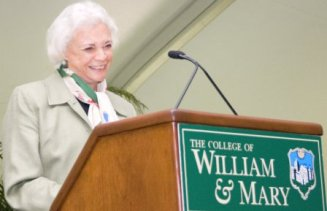O'Connor Urges Graduates to Protect Judicial Independence

William & Mary College Chancellor Sandra Day O'Connor exhorted members of the Class of 2008 to enter their profession with pragmatism and with a strong sense of ethics - and to do their part in the protection of American judicial independence.
O'Connor, a retired justice of the U.S. Supreme Court, addressed more than 200 graduates Sunday, May 11, as part of the Law School's 2008 commencement ceremony.
"Tomorrow you will be fledgling members of the legal profession," O'Connor told the graduates. "That means two principal things. First, you'll have to endure an endless number of lawyer jokes."
She said she didn't particularly care for lawyer jokes. "Lawyers don't think they're funny and everyone else doesn't think they're jokes," she noted, inspiring laughter from the audience. Striking a serious note, O'Connor said the second thing the graduates should remember is that lawyers must assume major responsibilities that go along with the privileges that are a part of the profession.
"Your first responsibilities, of course, are to your clients," said O'Connor.
"You have to help your clients resolve their problems, not necessarily their lawsuits," she added. "You have to develop skills as a negotiator. You need some practical experience in advocacy and negotiations."
She said that the client is only one of the two masters served by a lawyer. "Your other master is the law itself," she said. "You have to be true to the ethics and ideals of your profession at the same time that you advocate zealously for your client."
O'Connor, who became the College's 23rd Chancellor in April 2006, was introduced by Lynda L. Butler, interim Dean of the Law School and Chancellor Professor of Law. Butler described O'Connor as a fine role model.
"With her historic appointment as the first woman on the Supreme Court, she became a role model for all women, for all working mothers," Butler said in her introduction. "Nor has this role diminished with retirement; rather, it has evolved and grown."
During her remarks, O'Connor said lawyers need to be mindful of the moral and social implications of their practice, especially their positions as officers of the court.
"Don't get involved as one of the Enron problems, OK?" she asked to applause. "Show some intelligence, some honor, some decency when you practice law."
She also urged the new lawyers to support the U.S. constitutional system of checks and balances, noting that only a third of Americans can name the three branches of government - legislative, executive and judicial - established by the Constitution.
"The main way that the judicial branch can check the other branches is by declaring statutes or executive acts unconstitutional," she said. "This means that judges have the power to make the other two branches really, really angry. If judges never did that, they probably would not be fulfilling their constitutional duty."
O'Connor mentioned Brown v. Board of Education and United States v. Nixon as examples of an independent judiciary working to guard rights and to protect against abuses of power.
"Judicial independence doesn't happen all by itself," she said. "It's very hard to create and it's easier than most people imagine to destroy. And that's where you come in. We need lawyers to get out there and defend the concepts."
The following awards were presented at graduation:
Gilbert Bartlett '62, J.D. '69, received the Law School Association's Citizen-Lawyer Award which honors a graduate or friend of the Law School who stands squarely in the Jeffersonian tradition of outstanding citizenship and leadership.
Professor Laura A. Heymann received the Walter L. Williams Jr. Memorial Teaching Award, an award conferred by the graduating class in recognition of outstanding teaching.
Amy M. Markopoulos '08 and Issac B. Rosenberg were co-recipients of the Lawrence W. I'Anson Award, an award conferred upon a member, or members, of the graduating class who in the judgment of the Law School faculty have shown evidence of great professional promise.
Sarah A. Fulton '08 received the George Wythe Award, an award conferred upon a member of the graduating class who has demonstrated distinguished leadership for the good of the Law School community.
Sarah G. Landres '08 and Megan Tumi '08 were co-recipients of the Thurgood Marshall Award for distinguished pro bono work. The award goes to a member, or members, of the graduating class who exhibit the ideals of distinguished public service exemplified by U.S. Supreme Court Justice Thurgood Marshall (1908-1993).
Interim William & Mary President Taylor Reveley received the John Marshall Award, an award conferred upon a member of the Law School faculty or staff for exceptional service to the Law School. Marshall (1755-1835) was among the first students to study law under the tutelage of George Wythe at William & Mary. As Chief Justice of the U.S. Supreme Court, he had a seminal impact on U.S. history.